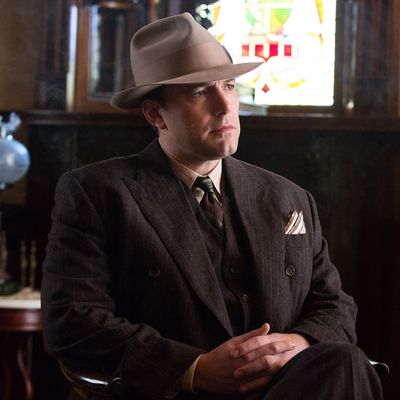
Ben Affleck’s adaptation of Dennis Lehane’s 1920s-gangster novel Live by Night is strangely low-impact — the movie brings out all Lehane’s weaknesses and none of his strengths. A big problem is that Affleck cast himself as Joe Coughlin, the reluctant Boston gangster (he preferred life as an unaffiliated outlaw) who turns out to be so smart at playing the long game that he ends up running all the rackets in Tampa for an Italian crime boss named Maso Pescatore (Remo Girone). Perhaps because Joe will never be a “made man” — he’s not Italian — he builds the closest thing you can get to a fair, politically progressive crime menagerie. He hangs out in the “colored” section of Tampa’s Ybor City. He takes up with a kind, beautiful Dominican-Cuban woman named Graciela (Zoe Saldana) who puts much of her money into shelters for women and immigrants. He vanquishes a psychotic Ku Klux Klan leader. Still, Joe burns for revenge against the Irish mob boss Albert White (Robert Glenister) who tried to murder him and caused the death of an Irish moll (Sienna Miller) who was White’s mistress and the woman Joe loved beyond reason. Keeping his head — and moral compass — in a fundamentally violent world is tearing Joe apart.
Affleck gets the sadness in Joe — or is able, at least, to hold a sad expression on his mug for the length of a given shot. He’s a real movie star. But he’s the opposite of a method actor. He’s more like the pre-method leading men of B noirs in the ‘40s and ‘50s who plugged away in one part after another and left little trace. You don’t feel there’s an emotional cost to his acting — unlike, say, his brother, Casey, who looks chewed up by everything he does. As Joe, Affleck would probably have no problem breaking character, putting on his director’s hat, and checking the playback.
That matters because Lehane’s writing has a depth of emotion that holds his rickety plots together. Affleck understood that when he cast his brother in Gone Baby Gone. So did Clint Eastwood when he put Sean Penn at the center of Mystic River. So did the makers of The Drop when they used Tom Hardy. Suffering actors all, they tapped into the pervasive grief of Lehane’s work, in which the protagonists are always coming from behind, in mourning or morally compromised in their own eyes or in mourning for their moral compromises. Joe’s dad (Brendan Gleeson), a Boston cop, utters the movie’s thesis: “What you put out in the world will always come back to you,” and Joe senses on some level that he’ll have to pay for the sins of his past. His obsession with harmony has, at its core, the dread of watching uneasy gangster alliances break apart at any moment and the destruction of everything he loves.
Once Affleck’s Joe gets to Florida, Live by Night loses its pulse and you’re left with a lot of pale characters, secondhand plotting, and maybe second thoughts about the daffy idea of a liberal-humanist gang boss. (Lehane’s 2016 follow-up, World Gone By, is a tighter, more interior, and far more gripping book. You can feel the influence of Hilary Mantel’s Cromwell series, especially Bring Up the Bodies — the certainty that the center, however shrewd and meticulously put together, cannot hold.) Live by Night isn’t as savvy as the other films Affleck has directed. It looks both expensive and blurrily rear-screen. The shootouts are too chopped up to follow and have no bite. There were much better action sequences in The Town, where Affleck also got an electric performance from Jeremy Renner to keep you on edge.
Here, the actors get little help. Saldana makes a hot entrance — you think she’ll be a crime kingpin (or queenpin) in her own right — and then becomes blandly supportive. Chris Messina needed one more defining scene and more close-ups to make Joe’s sidekick, Dion, fully register. Max Casella needed another scene, too, as the Italian don’s stupid, nasty son, to establish him as a real threat.
There are good, intense performances by Gleeson and Chris Cooper as the local sheriff, but both have played these kinds of parts before. The only extraordinary work is by Elle Fanning, who plays Cooper’s daughter, Loretta. She has two difficult scenes that she does brilliantly, the first as she heads off to Hollywood for a screen test and manages to embody (without a trace of banality) every well-scrubbed ingénue who has ever taken a similar path, and her final conversation with Joe, when she’s every shattered, morbid refugee of a world more terrible than she could have imagined. In between, though, she appears as a big-tent evangelist denouncing the sins of liquor and gambling, and her voice sounds too small to fill a tent. She has no histrionic power, no oomph. Does Fanning — a superlative screen actress — lack size? That’s unclear, but Affleck should have protected her.
Live by Night isn’t a terrible movie, like Ruben Fleischer’s synthetic Mickey Cohen atrocity Gangster Squad. It has some tart exchanges. (“You a man of your word?” “Depends on who I give it to.”) It’s absorbing. And it has enough action that you probably won’t turn it off when it comes on cable. But the material needs to be bigger, more momentous, as well as more intimate. It needs a leading man who knows he’s on a tightrope with every step, instead of one who can’t help signaling that gravity isn’t an issue.


